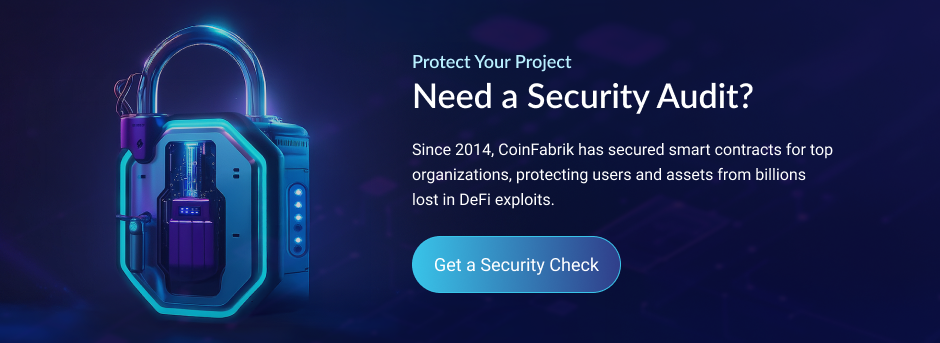If you’re interested in becoming a smart contract auditor in 2025, this article walks you through the full journey. You’ll learn and how to actually land a role as an auditor, covering the skills, education , tools, and career prospects. At the end of this article, we provide the best guides and actionable practices to achieve it.
What is a smart contract auditor?
In the blockchain ecosystem, smart contracts are the bureaucrats. These self-executing agreements operate without intermediaries, relying entirely on code to enforce terms.
While this brings efficiency and transparency, it also introduces unique security challenges. A single vulnerability in a smart contract can lead to catastrophic financial losses.
That’s why the demand for smart contract auditors is growing. As blockchain applications expand into industries, opportunities for skilled auditors are increasing
As a result, smart contract auditors have become indispensable in safeguarding blockchain ecosystems. At times they’re forensic tracing bullet holes in logic and pointing out where the gold might’ve leaked, but never touching the loot themselves. And sometimes They act as digital janitors cleaning up after developers who thought testing in production was an option.
Entering the field of smart contract auditing
Let’s start by saying that a smart contract auditor is not the same as code review, this type of auditor is responsible for examining blockchain-based code to detect vulnerabilities, assess compliance with protocol standards, and verify that the logic of the contract aligns with its intended design. This role demands strong technical expertise, critical analysis capabilities, and a comprehensive understanding of blockchain infrastructure. Auditors must assure that contracts don’t misbehave once they hit the wild. Auditors double-check that everything runs safely and as intended under real-world conditions
Building the Right Skills and Knowledge
To succeed as a smart contract auditor, you’ll need to be fluent in a few non-negotiables before touching production-level contracts.
Blockchain Fundamentals
- Understanding blockchain is non-negotiable. You’ll need to understand how smart contracts fit into the bigger blockchain picture. Consensus ensures integrity, but each chain executes logic in its own way. Without that foundation, effective auditing isn’t possible.
Programming Proficiency
- Smart contract auditors must be proficient in Solidity, the primary language used on Ethereum. Familiarity with other languages, such as Vyper, Rust, and Move, is advantageous since these are used in newer blockchain platforms.
Security Expertise
- In fact, You can’t ignore the math. From hashing to elliptic curve signatures, security flaws often hide where the cryptography begins. Auditors need to identify vulnerabilities related to authentication, data integrity, and access control.
Analytical and Problem-Solving Skills
- Indeed smart contract code can be intricate. An auditor must analyze complex structures, detect subtle vulnerabilities, and devise effective solutions.
Educational Pathways for Aspiring Auditors
For example, aspiring smart contract auditors don’t have a single set path. They patch it together like a custom build. Formal educat
ion in computer science or software engineering still lays the strongest groundwork, with universities such as MIT and Stanford now offering dedicated blockchain courses.
For a programming language , Solidity remains dominant thanks to Ethereum’s sheer gravity in the ecosystem. While Rust leads on chains like Solana and Polkadot. Learning these is essential, however languages like C++ (used by Bitcoin Core) and C# (used in Neo) are also valuable. This is crucial especially for auditors who need to understand different architectural approaches to smart contract logic and protocol-level details.
Pursuing a career as a smart contract auditor
Online education has become the go-to weapon of choice. Platforms like Coursera, ChainShot, CryptoZombies, and ConsenSys Academy offer guided paths from beginner to advanced levels in Solidity, security, and blockchain development. In addition, Ethereum.org provides direct access to developer docs, and the Parity and Solana teams maintain solid Rust resources.
For certifications, the CBSP or ConsenSys’s Ethereum Developer Certification hold industry weight. Though some hiring managers quietly admit they’d trade a shiny certificate for a GitHub repo full of real audits and bug reports.
Experience beats theory when it comes to catching million-dollar bugs. Therefore, watching YouTube channels like Dapp University, joining Discord communities, contributing to bug bounties on Immunefi, or finding a mentor through GitHub or hackathons often does more than another course.
Interning with blockchain auditing firms—even unpaid—can open real doors. Companies like CoinFabrik , Trail of Bit or, OpenZeppelin, regularly post opportunities for junior talent. In a field where self-taught is the norm, proving you can break contracts (ethically) is how you get invited to secure them.
Gaining Practical Experience
Learning theory is only half the battle; you’ll only sharpen your instincts by getting your hands dirty—nothing replaces breaking real contracts (ethically). For a career in auditing. Participating in blockchain development projects helps you understand the nuances of smart contract functionality. Open-source platforms like GitHub are excellent places to start. However breaking into smart contract auditing isn’t about reading more—it’s about doing more.
Real experience often starts with the unglamorous tasks: verifying token standards, running static analyzers like Slither or Mythril, or even experimenting with AI tools such as ChatGPT Code Interpreter to simulate audit steps. Platforms like OpenZeppelin Contracts and Foundry provide safe playgrounds for junior roles to test, tweak, and break things—quietly, before production does it for you.
Internships and Apprenticeships
Working with established blockchain firms provides real-world exposure. These opportunities allow you to learn from experienced auditors and gain insights into industry standards.
Entry points also include small freelance gigs: analyzing unverified contracts on Etherscan, building fuzzing scripts using Echidna for test coverage, or even reviewing community bounties on Discord servers.
Bug Bounty Programs and networking
For instance, many auditors cut their teeth on unpaid contributions to DAOs or small DeFi protocols, gaining not just exposure but also public artifacts for their resume. But don’t go overboard with free work, like “Never do that”.
Companies like CoinFabrik or Quantstamp often publish their methodologies, which junior contributors can try to replicate in sandboxed environments.
Internships in established firms or community-driven apprenticeships—like those listed on Ethereum Foundation forums—often put juniors on tools and workflows with no tutorial covers: from manually tracking contract upgrades across proxies to running regression tests on forks. If you can show you’ve caught real issues—even minor ones—in live or test environments, you’ve already moved beyond theory.
Expanding Your Audit Experience
Many blockchain platforms offer bug bounty programs, rewarding individuals for identifying vulnerabilities. Participating in these programs not only sharpens your skills and builds your reputation in the blockchain community, but also keeps you actively engaged with real-world threats and evolving attack vectors.
As a result, This directly supports your ability to regularly explore new developments in blockchain protocols, security practices, and smart contract standards. Staying involved through forums and industry newsletters further reinforces this continuous learning loop, keeping up with Discord threads and post-mortems is what stops you from falling behind in this fast-moving space.
Moreover attending conferences, meetups, and webinars helps you. Talk to people doing the work, on Twitter, at hackathons, or even in GitHub issues. That’s where the learning happens. Networking not only enhances your knowledge but also o you’d be surprised how often a casual chat turns into a job lead.
Tools and Resources for Becoming a Smart Contract Auditor
Smart contract auditors rely on a variety of tools and resources. A handful of trusted platforms like Remix, Truffle, and Hardhat, take care of the grunt work when building, testing, and deploying contracts, letting auditors focus on what matters: the security logic. This simplify the process of writing, testing, and deploying smart contracts. These tools are foundational for any development workflow in the Ethereum ecosystem. For security-focused analysis, auditors rely on powerful frameworks such as MythX, Slither, and Manticore, which provide static and dynamic analysis to detect vulnerabilities and ensure contract robustness before deployment.
Documentation and Standards
A solid understanding of Ethereum token standards—particularly ERC standards—along with widely used libraries like OpenZeppelin, is essential for any smart contract auditor. These resources offer well-vetted, community-accepted guidelines and reusable implementations , they help avoid the rookie mistakes that open the door to exploits.
- Smart Contract Auditor Roadmap 2025: Provides a comprehensive guide for aspiring auditors. (Blockchain Council)
- How to Become a Smart Contract Auditor: Breaks down the key skills, tools, and learning paths for newcomers. (BlockSec)
- QuillAudit’s Smart Contract Auditor Roadmap: A stepwise resource to get started with smart contract auditing. (GitHub)
Final Note
Smart contract auditing must be clearly distinguished from other software development functions. A Blockchain developer may assume various roles such as code designer, responsible for system architecture and high-level logic; low-code developers, who use abstraction platforms to build applications rapidly; DevOps engineers, who manage deployment pipelines and system infrastructure; and QA testers, who conduct functional and regression testing to ensure user-facing stability.
Each of these roles serves specific phases in the software development lifecycle, none of which focuses primarily on security assurance. In contrast, smart contract auditors work independently from the build pipeline. Auditors enter late in the process to provide an unbiased and security-centric evaluation, that’s why they stay out of the build cycle, they come in clean, with no attachments to the code.
Becoming a smart contract auditor in 2025 you’ll need to code, spot edge cases others miss, and always be two steps ahead of the latest exploit trends.










